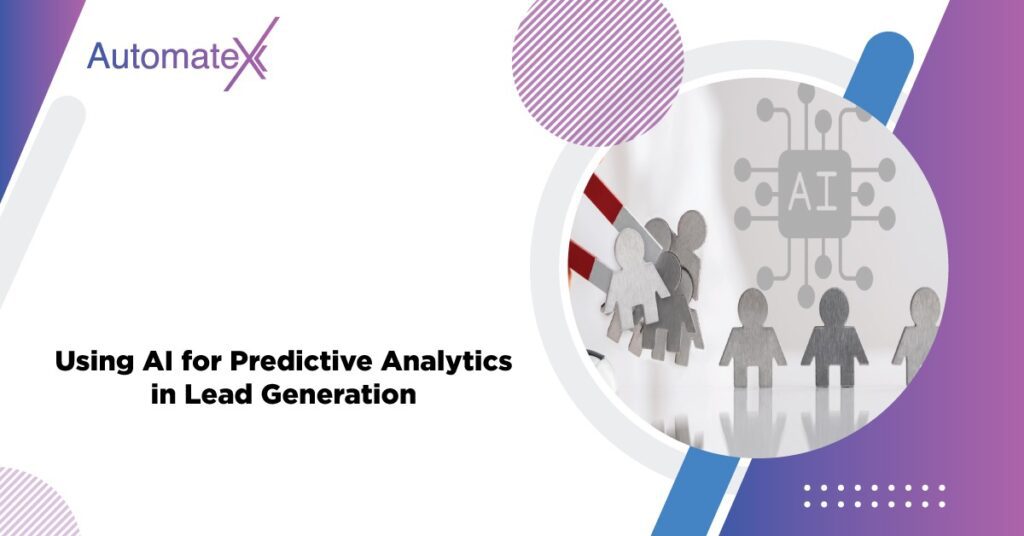In today’s competitive business environment, leveraging artificial intelligence (AI) for predictive analytics has become a game-changer in lead generation strategies. At Automatex, we specialize in harnessing AI-powered tools to forecast customer behaviors, optimize marketing efforts, and drive higher conversion rates for businesses across various industries.
Introduction to Predictive Analytics in Lead Generation
Predictive analytics involves using historical data, machine learning algorithms, and statistical techniques to predict future outcomes. In the context of lead generation, AI algorithms analyze vast datasets to identify patterns and trends, helping businesses anticipate customer needs and behavior.
Benefits of AI-Powered Predictive Analytics
AI-powered predictive analytics offers several key benefits for lead generation:
– Improved Lead Scoring: By analyzing historical data and customer interactions, AI can accurately score leads based on their likelihood to convert, allowing sales teams to prioritize high-value prospects.
– Enhanced Personalization: Predictive analytics enables personalized marketing strategies by segmenting leads according to their preferences, behaviors, and buying intent.
– Optimized Marketing Campaigns: AI algorithms optimize marketing campaigns by predicting which strategies are most likely to resonate with target audiences, thus maximizing ROI.
– Reduced Customer Acquisition Costs: By focusing efforts on leads with higher conversion probabilities, businesses can optimize resource allocation and reduce overall customer acquisition costs.
AI Algorithms Used in Predictive Analytics
Various AI algorithms play a crucial role in predictive analytics for lead generation:
– Machine Learning: Algorithms learn from historical data to make predictions about future outcomes.
– Natural Language Processing (NLP): Helps analyze unstructured data, such as customer feedback and social media interactions, to extract meaningful insights.
– Cluster Analysis: Groups leads into clusters based on similarities, aiding in targeted marketing efforts.
– Decision Trees and Neural Networks: Complex models that simulate human decision-making processes to predict outcomes.
Real-World Applications of AI in Predictive Lead Generation
In practice, AI-driven predictive analytics transforms how businesses approach lead generation:
– Customer Behavior Prediction: Predicting customer churn rates and identifying potential loyal customers.
– Sales Forecasting: Estimating future sales trends based on historical data and market conditions.
– Dynamic Pricing: Adjusting pricing strategies in real-time based on demand forecasts and competitor analysis.
Challenges and Considerations
While AI-powered predictive analytics offers substantial advantages, businesses must navigate challenges such as:
– Data Quality and Integration: Ensuring data accuracy and integrating data from multiple sources.
– Privacy and Ethical Concerns: Adhering to data protection regulations and maintaining transparency in data usage.
– Skill and Resource Requirements: Investing in AI expertise and infrastructure to effectively implement predictive analytics.
Future Outlook: Embracing AI for Lead Generation
Looking ahead, AI will continue to evolve as a cornerstone of lead generation strategies. Businesses that embrace AI-powered predictive analytics can gain a competitive edge by anticipating market trends, optimizing customer interactions, and driving sustainable growth.
Explore more about advanced strategies for AI-powered lead generation in 2024 at Advanced Strategies for AI-Powered Lead Generation in 2024.
FAQs about Using AI for Predictive Analytics in Lead Generation
-
How does AI predict customer behavior in lead generation?
AI predicts customer behavior by analyzing past interactions, preferences, and demographic data to forecast future actions and purchasing decisions.
-
What types of businesses benefit most from AI-powered predictive analytics?
Businesses across various sectors, including e-commerce, finance, healthcare, and B2B services, benefit from AI-powered predictive analytics due to its ability to enhance marketing effectiveness and improve sales outcomes.
-
What are some examples of predictive analytics applications in lead generation?
Applications include lead scoring models, dynamic pricing strategies, customer segmentation based on behavior, and personalized marketing campaigns tailored to individual preferences.
-
How can businesses ensure data privacy and security when using AI for predictive analytics?
Businesses should implement robust data protection measures, comply with regulations like GDPR, anonymize sensitive data, and prioritize transparency in data usage practices.
-
What are the potential challenges of implementing AI-powered predictive analytics in lead generation?
Challenges include data integration from disparate sources, the need for skilled AI professionals, interpreting complex AI outputs, and overcoming organizational resistance to AI adoption.

